Check out this video, thanks to @gracemcdunnough for the tip!
Some of this sound familiar?

The concept of “Life as a Game” is certainly not a new one, when I was a kid, the game of Life was my favorite board game of all time. I still remember the thrill of filling up my little car with boy and girl babies I imagined I’d have at some point in the far off future, or the crushing defeat of bankruptcy, a term I didn’t really understand, but in that context basically meant “Game Over.” Spin the dial – what does the game of Life bring you next?
And it’s not as if I’m not a big fan of video and online games – I cut my teeth on the Atari 2600/5200, hand drew maps in colored pencil to find Princess Zelda, played Ultima on a Commodore 64, still have an account on the Medievia MUD that goes back to 1994, have an 80 level holy spec priest on WoW (they nerfed holy spec, don’t get me started), and most recently celebrated the completion of my horse stable on Farmville.
I grew up on games – the first generation to grow up playing video games – I was a “Girl Gamer” back when we were a pretty rare breed and I’m still playing now that “gaming” in its various forms is so common that the Pew Research Center reports that, “Game playing is ubiquitous among Americans teenagers. Fully 99% of boys and 94% of girls report playing video games.” They also report, “More than half – 53% – of all American adults play video games of some kind.”
And yet, despite the fact that virtually all young people game, and over half the adults in the US game, there still appears to be a very finite line between “gaming” and .. everything else. We still delineate “real life” (RL) as separate from game spaces – even when the space isn’t actually a game space, as in Second Life. The skepticism and often openly hostile reaction of scorn/pity that Second Life residents get from non-SL peeps is almost remarkable considering that the very people delivering that heaping dish of disdain turn right around and log in to WoW or EVE or Farmville.
Just yesterday, in a debate about a topic wholly unrelated to gaming, someone I was arguing with bolstered his point with the concluding line:
 “I think of you as less of a person for using Second Life, and for no other reason.”
“I think of you as less of a person for using Second Life, and for no other reason.”
Now, to be fair, we were engaged in a sort of theatrical debate where the low blow is not only acceptable but expected, and it was all said in good fun and humor, but.. like with many kinds of humor, it was funny because it had the faint ring of truth. Many people actually DO think less of me as a person for using Second Life, just as a decade ago they thought less of me as a person for playing EverQuest, just as a decade before that they thought I was not only insane but maybe dangerously insane for talking to strangers on the internet through those weird BBSs and MUDs full of D&D playing soon-to-be-axe-murderers.
Ahhhh how times have changed. The internet, she vindicated me. And ahhh how times of changed, now half the adults in the US play WoW or some other game and it’s not so crazy anymore.  Alas, I’m still waiting for virtual worlds to vindicate me, but having gone through this combo-pity-scorn routine a few times, I’m not shaken by the current state of attitudes about virtual worlds, augmented reality (why would you want to look at DATA on top of the REAL WORLD on your PHONE, what’s wrong with you?!), or most of the other technologies I use that cause people to look at me askance and with wary eyes. (Twitter???? Whaaa???)
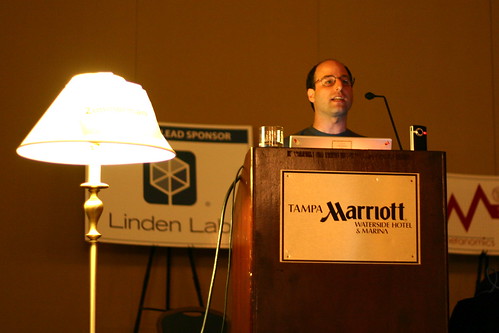
Barry Joseph delivers the SLEDcc 2008 keynote address.
I have to give all due props to colleague Barry Joseph (SL: GlobalKids Bixby) from Global Kids, an organization that does great work with youth in New York City, for introducing me to the concept of a “ludic life” at his keynote address at SLEDcc 2008.
His keynote talk, Living La Vida Ludic: Why Second Life Can’t Tip, is worth watching, and it’s one of those talks that sticks in your mind like a burr, at the time it didn’t quite penetrate (I was one of the conference organizers, so my brain was on 50,000 other things) but it stuck with me, and in the years since, the message he delivered only resonates more strongly with time.
Loosely translated, it’s about living a playful life. It’s about combining the adventurousness, fun, openness, exploration, and all of the other joyful aspects of our game play into our “real life”.  The central thesis of his keynote was that virtual worlds and other platforms like Second Life can’t and won’t tip, until the broader culture of “living la vida ludic” tips. One must come before the other, and back in 2008, he made it clear that the title of his talk could be taken in two ways – first, that virtual worlds like Second Life would NEVER tip – or that something was holding Second Life back from tipping into the mainstream. He left the question about which interpretation was right for the audience to decide, but I thought then as I do now that the answer was the latter. There are forces at work holding back virtual worlds, Second Life, AND the ability for us to live a ludic life as openly and as joyously as we wish we could.

Yes Virginia, NASA scientists say the earthquake in Chile may actually have knocked the earth's axis. It's not just your perception, the world has actually shifted.
As I said to a good friend of mine the other day, I’m struggling with this.. feeling I have, that all of the meta-narrative that stood at the very foundation of my understanding of the world – how the world works, where it’s going, where I fit into it, what I’m supposed to be doing – the meta-narrative from my childhood seems to not make much sense anymore.
The world seems off kilter. It’s changing so quickly, I don’t know anyone who feels like they can keep up with the pace of change. And so many major systems that underpin our society and culture appear to be, frankly, broken. On the rocks. Our government. Our banking and finance system. Our ecosystems. Our healthcare system. Our system of education. None of these systems and institutions appear to be meeting the needs of our society as we experience it TODAY. They all seem to be failing us.
Why? It’s a no brainer, of course, and not an original thought at all. It’s simple – the systems and institutions built to address the needs of a pre-digital-society don’t work to address the needs of a society that can get, transmit, and transform information as quickly as we can today.
And boy is that causing a lot of fear.
I feel it, don’t you?

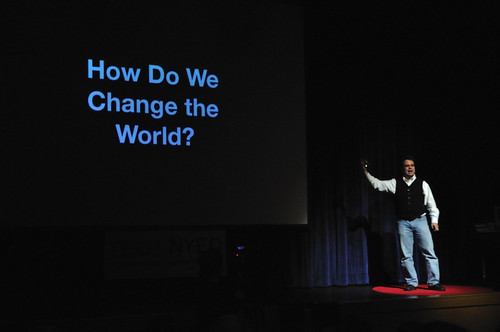
Chris Lehman at TEDxNYED explaining that changing education necessarily means changing the world. Photo credit WayneKLin.
The rousing chorus of last week’s TEDxNYED conference, where superstar educators from K-12 and higher ed like Larry Lessig, Henry Jenkins, George Siemens, Mike Wesch, Amy Bruckman, Dan Meyers, and others converged, is that the education system is not only broken – it’s getting worse. They blasted out conversation starters about why and how and what needs to change in the US (educational system).
Perhaps most importantly, the subtext of the conference was that the issues teachers and educators are facing aren’t just confined to the “educational system” – as if it’s some discrete thing disconnected from the society and culture at large – and indeed, as George Siemens said, considering that society dumps every ill and issue at the doorstep of education to solve, it’s amazing the system functions as well as it does. But take out the word “education” from these TEDxNYED Talks, and they are talking about what society at large needs to do to adapt to our changing circumstances. (The videos aren’t up yet, but they’ll be available on YouTube soon.)
At least for the purposes of this post, I think the first important piece of advice came from Michael Wesch. Which is simply this:
When a game changing technology enters a society or culture, you don’t have the option to opt-out. It changes everything.
All those Ludic Luddites, who fear the technology, avoid the technology, feel that the current systems of getting things done would work just fine if only they could better regulate, standardize, and enforce them, are just plain wrong. The world has shifted and there’s no turning back now.

Slide from Dan Meyers' talk at TEDxNYED - quests anyone? Photo credit kjarrett.
Well, I’m getting round to that.
As I watched these presentations and suggestions from teachers about ways to improve (society) education, I couldn’t help but see game elements – and the ludic life – infused throughout their talks.
When Dan Meyer talked about changing math curriculum to stop asking kids to give the answers, but instead help them figure out what the important questions are, it looked like creating good game quests to me.
When Lessig and Jenkins talked about mashup culture and how destructive it is to limit the creativity unleashed when you put tools in the hands of individuals, it reminded me an awful lot of how content gets created in virtual worlds like Second Life and OpenSim.
Or what about this quote from George Siemens’ presentation:
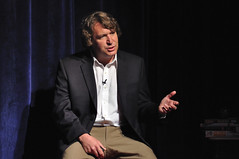
George Siemens at TEDxNYED. Image credit WayneKLin.
The solutions we need to address societies biggest problems – (global) warming, population growth, poverty – will be found through serendipity, through chaotic connections, through unexpected connections. Complex networks with mesh-like cross-disciplinary interactions provide the needed cognitive capacity to address these problems.
Sounds like the serendipitous, chaotic, and unexpected connections you form in WoW, or EVE, or any other game world, and “mesh-like cross-disciplinary interactions” is just fancy talk for good class balance. Can’t have too many tanks and not enough healers or the whole thing comes crashing down.
Ok. And one more, also from George:
The big battles of history around democracy, individual rights, fairness, and equality are now being fought in the digital world. Technology is philosophy. Technology is ideology. The choices programmers make in software, or legislators make in copyright, give boundaries to permissible connection.
This is, of course, the perennial battle between the game players and the game gods. Except wait, what? The whole story of the birth of the US is all about us being our own game gods. Hm.
We haven’t hit it just quite yet, but the elements of game play that Barry talked about in 2008 are starting to show up in the oddest of places. The World Bank is funding an Alternative/Augmented Reality Game called EVOKE that has thousands of people, from school kids to adults, and from all over the world, playing a “game” that promises to teach us how to address major global issues and respond to global crisis. Oh, and you might win scholarships, grants, or seed funding from the World Bank if you have a good idea. Put that on your resume!
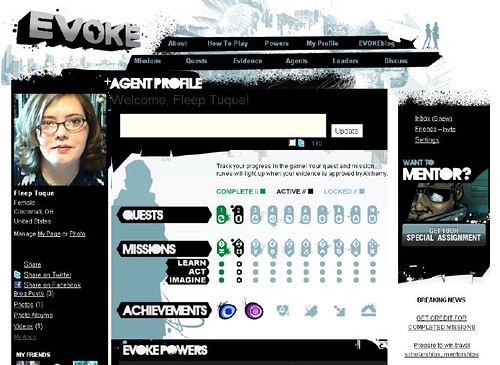
While Facebook and other social networks like Twitter have been the talk of the town, a recent NPR story cited research showing that more people play Farmville than use Twitter. And it isn’t your kid playing, it’s your mom. The average Farmville player is a 43 year old woman, and there are 80 million people playing. 80 MILLION.
Smartphone apps like Foursquare and GoWalla are turning our real lives into games, too.  I’m now the proud “Mayor” of Queen Mary’s Family Restaurant, where my mom and I go have breakfast on Sunday mornings. I had to edge out some other fella who got there before me.
Well, yes and no.
Many thanks to my good friend and neighbor in Chilbo, Roland Legrand (SL: Olando7 Decosta), for the post on his Mixed Realities blog that brought the video below to my attention.  Check this out:
Naturally, I’m interested in the ways that game mechanics, game culture, game concepts, and game design filter out and influence RL. And though I work in higher education, my undergrad degree is in Political Science and my not-so-secret passion is sort of the nexus where the emerging metaverse and game culture is changing “real life” society and culture, which of course includes education but goes beyond edu, too.
I know I’m not the first guild master to think that herding this bunch of cats is way more complicated than many RL jobs, or to realize the skills I learned adventuring with my guildies often had applicability to real life situations. I’d like to think I learned something about teamwork, diplomacy, compromise, and all sorts of organizational, strategic, tactical, and political skills through my journeys in worlds that only exist in bits and bytes.
Generally speaking, my career, my work, this blog, everything I’ve been doing for the last 10 years is about bringing this technology to people who don’t have it/know about it/use it yet.
But watching that video gives me the willies.
First, because I don’t think it is as far off in time as some think it might be. Second, because I don’t think it’s that far fetched in terms of what could actually come to pass. And third, because I’ve been a lowly peon player in the game god universes/metaverses for a really really long time. On an old BBS I’m still using, I’m one of the “moderators”. And you know what we say? This ain’t a democracy. Don’t like our rules, don’t play.
Furthermore, my post the other day about Stickybits demonstrates just how quickly the barriers to privacy are falling. I posted that barcode just to figure out how the service worked, and before I knew it, I was collecting the home addresses of my blog readers without even realizing what I’d done.

Want me to know your home address? Go ahead, download the app to your smartphone and scan that barcode. I’ll get an email within a minute or so letting me know you scanned it, and where you were on the planet when you did, right down to the address and a lovely Google Map pinpointing your exact geo-location.
And I guess I should award you 5 points if you scan it. Redeemable for.. I don’t know what yet. An hour long private tour of Second Life, I guess.
I don’t know exactly what train we’re on here, but the train seems to be moving ever faster and faster. And I worry more and more about who’s driving the train, and I have a sort of sick feeling that about half of the passengers have no clue that they are even on THIS train – I think they think they’re on a different train entirely, and that they’re driving it. But they aren’t.
I dunno.
As much as I love gaming, and I do love it, I’m not so sure I want Crest giving me points for brushing my teeth. I think I’ll have to come back to this.
Thanks for reading if you made it this far, and if you have any thoughts, I’m all ears.
As we zoom about in our in increasingly networked and connected lives, it is a good idea to remember from time to time that it’s kind of miraculous what we can do now. Here’s a comedian on the Late Show with a pretty funny commentary on taking technology for granted.
I started writing this post in 2008 but didn’t get it finished before the year ended, even with the extra second. In light of the subject, perhaps that is quite apropos.
Like most of you, I’ve been reading all of the end-of-year retrospectives and predictions posts, and scrolling through the “year in photos” or video clips or whatever, caught up in refreshing my memory about just how many things happened in 2008. Wars, elections, economic meltdowns, media shifts, massive natural and man-made disasters, and that’s not even including all my personal stuff. It was a crazy year no matter how you slice it!
And though it is.. overwhelming to absorb this barrage of our collective memories on the net, I do think there’s value to the tradition of reflecting on the year just past and the year ahead. If it’s honest reflection, and you or someone else learns from it, then there can never be too much of it so I refuse to apologize for the length of this post. =)
In reflecting on 2008, my experience was one of recognizing “limits”. Some of them are absolute limits, but some of them are just current limitations that I know will change in the future. Some of them are artificial limits, too, and those seem to deserve special attention since it’s easy to make bad choices if you’re working with falsehoods.
The list below describes some of the limits I ran into in 2008…
 I won’t belabor the point, we’ve all heard plenty of analysis and finger-pointing, but I will repeat the headline from my initial blog post at the beginning of the end of the beginning of the crisis:
I won’t belabor the point, we’ve all heard plenty of analysis and finger-pointing, but I will repeat the headline from my initial blog post at the beginning of the end of the beginning of the crisis:
Privatizing Gains, Socializing Losses
On the days when I feel most pessimistic, I think the TARP bailout is nothing more than a wholesale absconsion of our national treasury with perhaps more on the way. So far at least, the US government seems to be much more concerned about the troubles of our corporate citizens than the troubles of our human citizens. On my optimistic days.. I have the teensiest bit of hope that _someone_ _somewhere_ will have the will and the power to do what’s best for the people, not just what’s best for the corporations.
The economic problems have limited the options for many people I know – friends and relatives laid off, retirement nest eggs shrunk to nothing, people unable to sell or buy houses and get on with life. On a personal level, I haven’t felt this economically pinched in a long time. My modest university salary isn’t keeping up with the rate of change very well and in 2008 I began to really hit the limit of my budget in ways that cause me to question what I’m doing, how I’m doing it, and how much I can scale back.
Of course, many people are in tight situations right now, that’s why they call it a recession! But it’s what choices you make when you start to hit those limits that define who you are as a person and as a people. The government (of the people, by the people, for the people) has choices, too. I guess we’ll see in 2009 what choices we all make in light of these new limits and I hope for all of our sakes that they turn out to be good choices.

Of all the limits on my list, this one felt really good to bump up against. I can’t say how immensely proud I am of my country for the results of the 2008 presidential election. I am relieved to know that the president-elect’s middle name is Hussein and his last name sounds like Osama, and he’s black, and spent some time living in a Muslim country, and grew up in a non “2 parent/2.1 kids” houseshold, and that none of these things kept him from being elected. Not that racism has ended by any means, but this was an example of its limits and it really does give me hope.
On the personal side, my 74 year old grandpa who still refers to people as “colored” from time to time, and who has been a staunch Republican voter all of his life, actually voted for a black Democrat. Yes Virginia, hell really did freeze over! I can’t take 100% credit for this change of course, but we had a lot of downright difficult and uncomfortable conversations about race, so this year’s election felt like a personal victory as much as a national milestone.
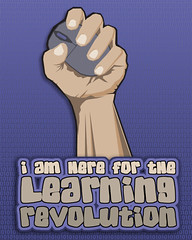 It’s possible I am living in a concrete-reinforced, super-duper-thick, no-sound-enters-or-escapes echo chamber, but it seems that everywhere I turn, everyone from _everyone_ is convinced that the American educational system is in desperate need of a massive, major overhaul. In my own neck of the woods, Ohio is in the process of implementing a state-wide university system, several education related organizations that are funded by the state are being abolished or merged, and a couple of universities including my own are switching from quarter systems to semesters (not as simple as it may sound and more expensive than you might think).
It’s possible I am living in a concrete-reinforced, super-duper-thick, no-sound-enters-or-escapes echo chamber, but it seems that everywhere I turn, everyone from _everyone_ is convinced that the American educational system is in desperate need of a massive, major overhaul. In my own neck of the woods, Ohio is in the process of implementing a state-wide university system, several education related organizations that are funded by the state are being abolished or merged, and a couple of universities including my own are switching from quarter systems to semesters (not as simple as it may sound and more expensive than you might think).
So change is happening already in a pretty big way, but I’m not sure how much these changes will address some of the underlying problems. One of which, I am convinced, is a staggering lack of understanding about the power of current IT/web/net based technologies. There is increasing curiosity at all levels – thank goodness or I wouldn’t have a job! But from administrators to faculty to staff, I’m perpetually shocked by how little others use the web even for basic things,like as a reference system. Everyone now uses email, of course, and LMS adoption has increased tremendously in both breadth and depth of use, and the core university business and billing systems are state of the art, but the social media/personal empowerment side of the web doesn’t seem to have penetrated academia very much yet at all. You might be surprised how many faculty don’t know about using quotes in google searching, for example, or who don’t read the blogs of their peers from other institutions.
I find that pretty distressing for a lot of different reasons, not least of which because this lack of understanding really limits my choices as a student (or potential customer, if you prefer).
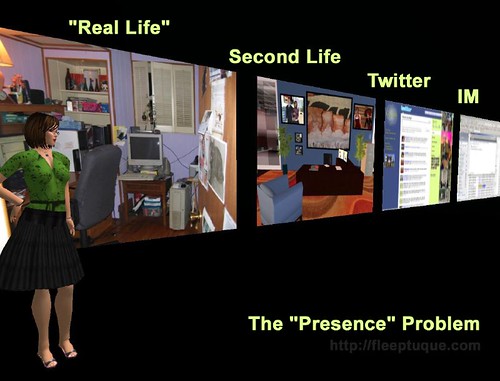 The first problem is that the thing I want to study not only doesn’t have its own discipline or recognized curriculum, most people aren’t even aware it exists! My area of study is the metaverse and I spend far more time trying to demonstrate that it is “real” (ie has real impact) and justifying why we should be studying it than anything else. What time I do get to spend on actual research doesn’t count towards tenure, and unfortunately, most of my output is in blog posts and wikis and PDFs and Second Life builds, and none of these things will get me a degree either. They aren’t “accredited” kinds of output.
The first problem is that the thing I want to study not only doesn’t have its own discipline or recognized curriculum, most people aren’t even aware it exists! My area of study is the metaverse and I spend far more time trying to demonstrate that it is “real” (ie has real impact) and justifying why we should be studying it than anything else. What time I do get to spend on actual research doesn’t count towards tenure, and unfortunately, most of my output is in blog posts and wikis and PDFs and Second Life builds, and none of these things will get me a degree either. They aren’t “accredited” kinds of output.
The second problem is that even if I could find a good fit in a program, then what? Will I be able to bear sitting in a classroom with a bad teacher who regurgitates the text book and wants me to regurgitate it too? Will I be able to keep my trap shut when we all hand in our papers to the prof and learn nothing from each other instead of sharing them so we all learn more?
 When I think of it, I tend to tell myself and others that I can’t find the time or money to go back to grad school right now (artifical limit, I’m sure I COULD if I were willing to radically alter my life), but the truth is something different: I can’t bear the thought of fitting my learning style back into that crummy old model when I’ve found something 1000000 times better – the entire web is my school, my laboratory, and my teacher. I would guess that in 2008 I read more reports, white papers, and peer-reviewed journal articles (and thousands of blog posts and news articles), attended more lectures by more world-class thinkers and teachers (and talked to them, individually!), and had more hands-on, active and engaging learning experiences than I have ever had in any other year of my entire life – in school or out. I also spent a heck of a lot of time reflecting on what I learned, sharing it with others, collaborating on shared learning experiences, and had a few pretty nice milestone publications of my own.
When I think of it, I tend to tell myself and others that I can’t find the time or money to go back to grad school right now (artifical limit, I’m sure I COULD if I were willing to radically alter my life), but the truth is something different: I can’t bear the thought of fitting my learning style back into that crummy old model when I’ve found something 1000000 times better – the entire web is my school, my laboratory, and my teacher. I would guess that in 2008 I read more reports, white papers, and peer-reviewed journal articles (and thousands of blog posts and news articles), attended more lectures by more world-class thinkers and teachers (and talked to them, individually!), and had more hands-on, active and engaging learning experiences than I have ever had in any other year of my entire life – in school or out. I also spent a heck of a lot of time reflecting on what I learned, sharing it with others, collaborating on shared learning experiences, and had a few pretty nice milestone publications of my own.
Everywhere I look, I’m butting up against limits. Limits of the existing system, limits to people’s understanding about what it is I want to study, limits in program and curriculum choices, personal limitations (financial, practical, selfishly wanting to learn MY way instead of THEIR way)..
Furthermore, despite the free and wonderful education I received from the intarnets this year, I also learned that there are limits here too. There are limits to how much information I can process, how many connections I can form, and how many channels of communication I can keep up with. There are absolutely, most definitely limits to how many emails I can process in a day. There are limits to how much I can learn on my own unaided by others. I often have questions, need help, need guidance, need mentoring, need direction. I know without a doubt my work and output would improve if I had a better foundational understanding of both the technology that makes the metaverse possible and the research that already exists about human behavior in online environments. I don’t for a second believe I can “master” this material all on my own, even with the tremendous resources the web offers.
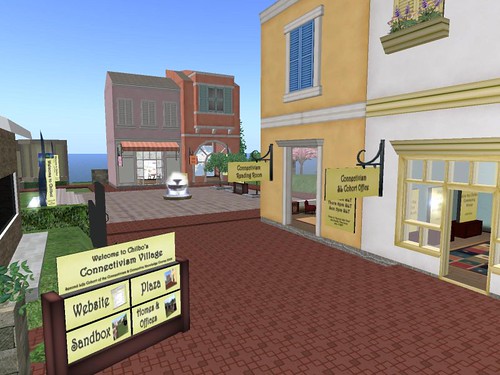 And of all my learning experiences online this year, I’m perhaps most grateful for my experience with the Connectivism & Connective Knowledge MOOC (Massively Open Online Course), because it _broke_ some (artificial) limits in my understanding about what a “class” is and could be, reinforced some limits I was aware of (how much info/connections/channels I could keep up with), and gave an example of how universities might overcome limits in how many students they reach.
And of all my learning experiences online this year, I’m perhaps most grateful for my experience with the Connectivism & Connective Knowledge MOOC (Massively Open Online Course), because it _broke_ some (artificial) limits in my understanding about what a “class” is and could be, reinforced some limits I was aware of (how much info/connections/channels I could keep up with), and gave an example of how universities might overcome limits in how many students they reach.
Without a doubt, these limits are frustrating, but not altogether discouraging. It just means there’s much work to be done, and I sincerely hope decision makers at the institutional level are paying attention to technology, but at the same time, I also hope that those of us using and evangelizing technology are being honest about its limits even as we explore its promises.
And speaking of technology evangelism…
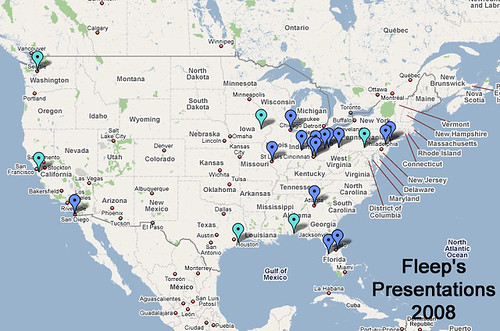 My suitcases are tattered from so many cross-country flights here there and everywhere talking about Second Life, Web 2.0, and the emerging metaverse. I gave talks at conferences and workshops and lunches, to teachers, professors, administrators, instructional designers, businesses, entrepreneurs, laywers, government employees.. so many different sectors of society. What I’ve taken from all my days on the road is that there’s a real lack of perceived value and ROI. 1) People need to see more evidence that this technology is useful for accomplishing their goals before they will be willing to invest the time and resources it takes to get to successful implementation. 2) The technology itself must become cheaper and easier to use.
My suitcases are tattered from so many cross-country flights here there and everywhere talking about Second Life, Web 2.0, and the emerging metaverse. I gave talks at conferences and workshops and lunches, to teachers, professors, administrators, instructional designers, businesses, entrepreneurs, laywers, government employees.. so many different sectors of society. What I’ve taken from all my days on the road is that there’s a real lack of perceived value and ROI. 1) People need to see more evidence that this technology is useful for accomplishing their goals before they will be willing to invest the time and resources it takes to get to successful implementation. 2) The technology itself must become cheaper and easier to use.
This is not revolutionary news, I know. But I’m reminding myself because as I mentioned above, I genuinely hope to do more research into those areas so that the next time I spend all day flying across the country just to give a two hour talk, I feel like it was really and truly worth the trip for me and the audience and the university that paid for me to do it.
I guess this means my “zealot phase” (and hopefully “self-righteous jerk phase”) is over for the moment. That isn’t to say that I’ve given up, but rather that I’ve learned the limits of what I, Fleep can do alone. I need to start leveraging my networks better and work in collaboration with more people instead of running myself ragged trying to do too much alone.
Of course, the job of evangelizing would be a lot easier if the thing itself were easier. Alas, we face some tough issues. The metaverse as a concept is mind-boggling for many, the best iteration of it at the moment (Second Life) is hard to use and has serious limitations, and everything else out on the horizon is still in alpha/beta phase.
I really can’t stress enough what an obstacle our current lack of.. vocabulary is. What is a virtual world? What is the metaverse? What the heck is Castranova talking about with all this synthetic stuff?
Earlier this year when I was struggling with the Looking to the Future: Higher Education in the Metaverse piece, the hardest part was explaining what the metaverse currently IS, nevermind what it might be in the future. Here’s what I wrote:
In its current context, the metaverse is a complex concept. For the purposes of this article, the definition in the Metaverse Roadmap will suffice: “In recent years, the term has grown beyond Stephenson’s 1992 vision of an immersive 3D virtual world, to include aspects of the physical world objects, actors, interfaces, and networks that construct and interact with virtual environments. . . . The Metaverse is the convergence of 1) virtually-enhanced physical reality and 2) physically persistent virtual space. It is a fusion of both, while allowing users to experience it as either.â€
In short, we can imagine multiple and myriad digital mirrors of the real world existing alongside multiple and myriad digital worlds that do not represent the real world, all used for a variety of purposes, tied into a variety of communication methods, and populated by any user with Internet access, as well as a steady stream of data originating from objects and devices in the real world.
That’s awful! A mouthful of confusing stuff and I feel very disappointed in myself that I couldn’t find a better way to communicate it. That’s a limitation I (we) must break through in the coming years.
Beyond the limits of our terminology, there are serious limits with existing platform(s) that can’t be ignored either. I still believe that anyone interested in the metaverse must be in or at least paying attention to Second Life – Linden Lab’s platform and the OpenSim derivatives are the most promising metaverse project on the horizon, and perhaps more importantly, the people using, working, and playing in Second Life simply _are_ the vanguard.
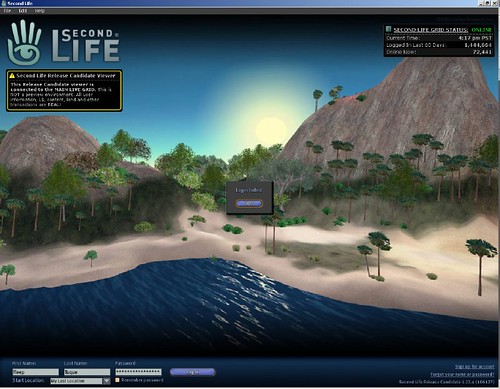 But Linden Lab’s Second Life, and the alpha-stage OpenSim grids, are still extremely limited in their enterprise use. Whether the intention is to use it as a social or collaboration space, or as a modeling and prototyping space, or to explore the new frontiers of music and art made possible in these worlds – the platforms need a LOT of work across the board, from the GUI to reliability to providing access to other digital content. Sadly, after 5 years of being out of beta, Second Life’s group IMs still don’t work reliably. I can’t show a flash or .wmv movie in Second Life, can’t collaboratively access webpages and documents with others easily, and it takes forever and 50 steps to do something as simple as making a prim clickable to launch a webpage.
But Linden Lab’s Second Life, and the alpha-stage OpenSim grids, are still extremely limited in their enterprise use. Whether the intention is to use it as a social or collaboration space, or as a modeling and prototyping space, or to explore the new frontiers of music and art made possible in these worlds – the platforms need a LOT of work across the board, from the GUI to reliability to providing access to other digital content. Sadly, after 5 years of being out of beta, Second Life’s group IMs still don’t work reliably. I can’t show a flash or .wmv movie in Second Life, can’t collaboratively access webpages and documents with others easily, and it takes forever and 50 steps to do something as simple as making a prim clickable to launch a webpage.
And those are the simplest technical limitations that need to be overcome. That’s not even getting into the wet, squishy world of legal, philosophical, and social questions: content creator rights, intellectual properly, who has jurisdiction, who governs these spaces, code as law, what’s happening with all of the data we generate from “living” in these spaces and how can we protect ourselves from its misuse, what are the social implications for communities moving to the metaverse, and on and on and on..
In other words, we have a LOT of work to do.
 Yes, I’m sorry, this one gets a whole bullet point of its own. Do you have ANY IDEA how long I waited, and with how much _anticipation_ I waited for the release of Spore? (Many many years, and a lot, respectively.)
Yes, I’m sorry, this one gets a whole bullet point of its own. Do you have ANY IDEA how long I waited, and with how much _anticipation_ I waited for the release of Spore? (Many many years, and a lot, respectively.)
Others have done a much better job than I in analyzing just why it was such a rotten egg, but I think that might be my biggest (most trivial) disappointment of the year.  I don’t know where it all went so wrong, Will, but dude, you really let us down.
(Sorry, needed a little levity before tackling #7..)
In late 2007, we learned that my Dad (grandpa, actually, but my dad in all other ways) had stage-4 metastatic lung cancer that had already spread to his adrenal glands. By mid-2008, it had spread to his spine. Helping to take care of him through this battle with cancer has been excruciating and it affected every single day of the year for me.
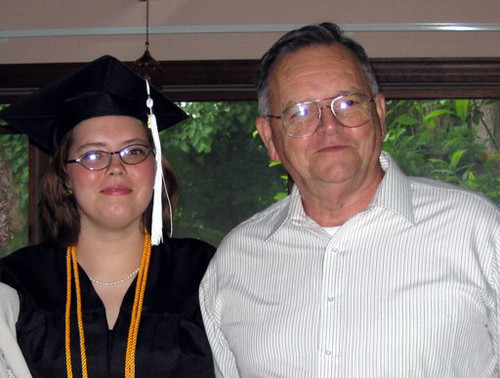
I know that death is a part of life. I know that death is inevitable. I know that I am neither the first nor the last person to lose a parent or to lose a loved one to cancer. I know that some day I will die. I know all of these things, but I’ve never _felt_ them until now. In my heart, I know it’s a minor miracle that he’s survived more than a year past the initial diagnosis, and it’s a gift that we’ve had all this time to say goodbye, share memories, and adjust to the hard reality. But it has also irrevocably changed my sense of time. I see the limits it imposes on us all in the starkest of terms now.
This experience has also made me wonder how on earth people without families or support networks manage in the face of serious illness (something we’re all bound to face) because without a doubt, I have finally seen the limits of the American health-care system up close and personal.
Wow, what a wreck. I don’t even know where to begin. The absurdities of insurance claims and Medicare, Part-D and doughnut holes, hospital staff that don’t even put on clean gloves unless you ask them too, different doctors with different charts and lab results and patient information systems that don’t talk to each other, medication regimens that require a PhD and 50 gazillion bottles, refills, and dosages to keep up with, doctors prescribing medications that conflict with pre-existing orders… the list goes on and on and on and on. It’s insane. INSANE.
Our family care-team is made up of four intelligent, literate, capable people and we can’t really keep track of it all. The hoops are simply ridiculous, the cracks in the system are more like black holes, and for all the mistakes or near-mistakes we’ve caught, I fear to think of all the ones we didn’t. And I would be remiss if I didn’t mention my deep bitterness that the _only_ part of the American health-care system that appears to be using IT efficiently is the damned billing systems. Sharing information about the patient to improve care? That’s a spaghetti mess, but they can sure share information about how much it all costs!
…
Perhaps my viewing the year 2008 from this prism of limitations is all the result of Dad’s cancer; maybe it’s colored my view so much that limits are all I see at the moment. But I don’t really think so. When I look at what’s happening in a broader context, I see that the American economic, education, and health care systems aren’t the only large-scale systems and institutions that appear to be feeling the strain.
For one, the financial/economic crisis is definitely a global one. It’s not an indivual experience, or a national experience, it’s a global one. Even those who haven’t felt the pinch yet have certainly felt the fear.
For another, I believe wars and violence result when political systems fail. Mumbai. Iraq, Afghanistan, Pakistan, Sudan, Palestine, Georgia, and many more places besides, deaths caused by people killing other people, caused by the limits of our existing political institutions.
Human activity in combination with completely “natural” weather and geological phenomena are rapidly, and I mean RAPIDLY changing our environment. The very finite resources of the planet and the real consequences of natural disasters are absolute limits that we simply can’t afford to ignore. The earthquake in Sichuan, China killed almost 70,000 people. The Nargis cyclone in Myanmar killed almost 135,000 people. Predictions seem to indicate that more trouble is on the way, and for the most part, our individual, national, and global responses to these challenges have seem limited by disorganization, misinformation, and a terrible refusal to plan for the reality we all know is coming. It’s absurd. And frightening.
I should probably stop there, this post already turned into something of a monster and I could go on in this vein for quite a while. But the lingering question I have at the end of all this reflection is this:
Have we reached the limits of our patience with behaviors and systems that just plain don’t work anymore?
I sure hope so, because the upside, the real benefit to recognizing these limits, is the ability to leap into the paradigm-shift – and leap we must.
The parameters aren’t what you thought they were.
The rules of the game are changing.
The world of the 21st century is different than the world of the 20th.
The sooner we come to terms with it, the sooner we can start dealing with it. These limits – even the artificial ones – really need to, can, and must be addressed.
I don’t know if I’m up for all the challenges I see looming in the days ahead, with my work, my personal circumstances, with Dad’s cancer. I don’t know how to best prepare, either, but if I’m sure of anything after 2008, it’s that I don’t have a choice about it anymore. The changes are already coming too thick and too fast to ignore, best get with it, buckle down, and get ready.
(And 10 days after the new year, I finally get this posted. Hooray.)
In honor of Veteran’s Day, Life4u reporter Draxtor Despres produced a story when the Vietnam War Memorial was created in Second Life last year. His piece also discusses the state of the War in Iraq at that time, and it’s interesting to look back and remember how much the Wall memorial touched all of us who experienced it in-world (in Second Life), and what a powerful reminder it was of the actual human cost of the Vietnam War. All the more timely considering our ongoing conflicts around the world.
I recommend that you visit the Wall in world if you can. I think it’s sometimes difficult for those who have not fully immersed into a virtual environment like Second Life to understand the emotional power that these spaces can have. I think, though, if any human emotion is truly universal, it must surely be grief, and the pixelated etchings of thousands of names along a long somber wall is beyond touching, even in virtual form. The seemingly unending list of individual names reminds us that each person on that list was someone’s son or daughter, mother or father.. and the virtual representation of it doesn’t detract from its simple message.
Experiencing it in Second Life was not the same as when I went in-person with my mother and my sister to DC – a rainy day that slicked the memorial and made the surface as reflective as a mirror, so that I saw my own face overlaid with the names of the soldiers on the wall – but it was an equally moving experience. Instead of sharing that collective sense of grief with just my family, in the virtual world I was sharing it with people all over the terra world – who no matter our nations or affiliations or politics – all abhor the cost that war brings.
Thanks to Draxtor for this timely reminder, and to all of those who contributed to the creation of this memorial in Second Life.
This post is for Prof. Jenning’s Communication & Technology class. If you want to comment, please comment back on the class blog so Prof Jennings sees it! – Fleep
The quote in the title of this post comes from Gretchen Morgenson, who writes the MarketWatch column for the Sunday New York Times, on the 9/19/08 episode of PBS’ Bill Moyers Journal. Watch it.

I am so thoroughly disturbed by the current state of affairs in the US economy that I must put all political correctness aside for a moment and ask you, dear reader, for a reality check.
It appears that our government is about to take on a tremendous amount of debt by nationalizing private entities, buying trillions in bad debt, and by some accounts, taking on some 70% of the mortgages in the United States.
This is unprecedented. Cataclysmic. Terrifying.
I spent some time last night actually watching TV, something I do less and less of these days, catching up on a backlog of Tivo from the past week. I watched a bunch of news reports, pundits, and analysis of how and why this economic crisis has come to a head, what the government is doing about it, what those who have been reporting on the financial sector for 30 years think about it, and the whole time I’m thinking to myself, wow: I have absolutely no faith that anyone in the US government or otherwise actually knows what they are doing with regards to this imploding/exploding economic mess.
If you somehow aren’t following this, you should be. Every American citizen certainly should be, because we the American people are about to be saddled with TRILLIONS of dollars of more debt – and I cannot imagine how this won’t impact the rest of the world in some way – so you should be paying attention even if you aren’t in the US. Did I mention _trillions_ of dollars in new debt? I can’t really fathom a trillion dollars, personally, it’s still hard for me to wrap my mind around billions of dollars. Here’s a quick primer, if you’re trying to catch up:
Government Pledges Swift Financial Crisis Rescue
Wall Street Turmoil Marks Wholesale Banking Shift
So, from what I can tell, the last 30 years of banking deregulation (i.e. relaxing the laws, standards, and oversight of what financial institutions and Wall St. investors are allowed to do), has led to ever larger financial institutions creating ever more complex financial “products” that have become so damned shady and complicated that even Wall Street itself doesn’t understand what they’ve gotten us all into.
You’d have to have been hiding under a rock to not know that a bunch of companies made a bunch of risky loans for people to buy houses they couldn’t really afford, and as the price of everything (especially energy) began to soar, a bunch of these people couldn’t afford to make the payments on their homes anymore. The companies that loaned them the money weren’t too worried, cause they’d “packaged” up big bunches of these loans and “sold” them to other companies and banks, who then themselves sold pieces of this debt to a bunch of other companies and banks, and so on and so on. And as more and more people stopped being able to pay their mortgages, more and more of these companies and banks were stuck holding the bag on all this debt that no one was paying on. This is the “Subprime Mortgage Crisis” that we’ve been hearing about all year.
Except it seems that the people in the US government and the geniuses on Wall St. either didn’t know or didn’t want to admit that these “packages” of defaulted loans had become so widely sold, traded, and mixed in with other stuff, that even big, stable, long term financial institutions and companies were in big trouble as more and more people became unable to pay for their houses. Suddenly the troubles of “Main Street” were wreaking havok on “Wall Street” and everyone began to panic. It got so bad, that big name companies that everyone thought were safe and stable started filing for bankruptcy and begging other big banks to buy them, it got so bad, that people and companies began to take their money out of money market accounts and other funds and that caused even MORE people to panic.
And so, in the span of a week, the Bush Administration’s people have stepped in and said, don’t freak out, we, the US government, will take over some of these failing companies, and we, the US government will insure your money market funds, and we, the US government will take on the debt of all these houses that no one is paying for anymore. And Wall Street rallied at this news on Friday and had a big party that Uncle Sam was going to swoop in and save the day.
…
From what I can tell, this is the craziest, scary economic situation of our lifetimes. The financial health of the United States of America hasn’t been this jeopardized since the Great Depression.
…
Now one of the analysts on PBS said that you don’t stop to fix the leaks in your roof when the hurricane is still going strong, you just do what you have to do to survive the hurricane, and you fix the structural damage when it’s over. I think that’s true. I think if the government had not stepped in, goodness knows how far reaching this crisis might have become, it’s truly terrifying to think about, particularly considering how much US debt is owned by foreign investors.
But. BUT.
It seems to me that this means that the US government is going to make damned sure that the free market capitalists don’t loose THEIR homes and savings and retirement, and the ordinary people who have already lost their homes and savings and retirement are just out of luck. For all of my living memory, the REPUBLICAN PARTY has stood for business, for smaller government, for telling regulators to butt out of what business does, let the all-knowing all-wise market sort out the winners and losers. And when they were winning, all those profits, all that money, was THEIR money and the government shouldn’t tax it, shouldn’t take any of it, the American people as a whole shouldn’t share any of it, because it was the gutsy risk-taking of the capitalists that led to the profit in the first place, and the market rewards winners and punishes losers. Not two weeks ago I saw a political ad for John McCain talking about making the tax cuts to the wealthy that the Bush Administration enacted early on permanent.
Except now, when the all-knowing, all-wise market started doing exactly that, started punishing the risk takers who were taking TOO MUCH RISK, now the REPUBLICAN PARTY is saying wait, hold on, the American people, the US government (you know, the ones who didn’t get to share in the wealth cause it was all YOUR money), well, we’ll take on a bunch of your debt. We’ll take on a bunch of the risky crap that you’ve gotten yourselves into. Hell, we’re even going to take over some of your companies. And the free market capitalists are saying HALLELUJAH, yes please, please take all this mess we’ve gotten ourselves into. PLEASE TAKE IT. The financial press is using words like toxic, poisonous, and radioactive to describe this debt. The wonky economic analysts in their rumpled suits and crooked ties and silver hair, the people who have been studying this stuff for their whole professional lives admit that even they don’t understand exactly how “toxic” this toxic stuff is.
And me and you, Joe, we’re about to get handed that bag of toxic stuff.
…
My undergraduate degree is in Political Science. I (sadly) didn’t focus on economics as much as I wish I had, and I can’t claim to understand everything that’s going on right now if even the pros don’t have a clue, but I just have to put this out there, publicly, for my own conscience.
The REPUBLICAN PARTY, representing free-market capitalists, has largely had their way in terms of economic policy, they have successfully gutted many of the laws put in place after the Great Depression, and they have successfully protected the profits – the sickeningly vast profits – of a very, very tiny percentage of very, very wealthy Americans.
I’ll sit tight with everyone else while the hurricane is upon us, but when it’s over, we have a LOT more than just repairing the roof to do. I personally know people in my family, people in my social circle, who are facing homelessness and dire economic circumstances. I personally know people who got a few thousand dollars into credit card debt (and I’m talking $4-5000 range) who then had something bad happen, an illness, a job loss, who were unable to get out from under it and are struggling to just plain feed their kids. And I didn’t see Uncle Sam coming to bail THEM out.
I am angry. Afraid. Worried. And I genuinely believe that the REPUBLICAN PARTY has quite literally wrapped themselves in the American Flag and used every dirty trick in the book to keep the average, church-going American distracted by issues like guns, abortion, and gay marriage so they can rob our country blind. And they seem to be getting away with it.
When does it stop? When does the party of “Country First” actually start putting the country – the whole country, not wealthy investors – first?
I do not understand how any sane person could vote for John McCain in this election. I really don’t. I don’t know how any sane person could be watching this and not see the horrible irony of wealthy “government keep your hands off” investors begging the government to take on their private debt, so much money than I can’t even fathom it in any real sense. 35% more than the entire US defense budget. 4/5ths of the output of our entire national economy in debt.
It’s staggering. Just plain staggering.
And the last time I looked, this is what CNN’s homepage looked like. The only indication of this on the front page? A tiny link on the right.

And on that depressing note, I’m off to finish laundry and go to my grandpa’s house. He grew up in just-post depression America, and I hope he has some damned good advice for me.
Thanks to Kevin Jarrett for this tip! (PS Kevin was just featured on an NPR segment about tech in schools! Listen here!)

WHERE WE STAND: America’s Schools in the 21st Century, premiering
Monday, September 15, 2008 at 10 p.m. on PBS, presents a frank
evaluation of our educational system’s strengths and weaknesses.
Hosted by Judy Woodruff, Senior Correspondent for The NewsHour with
Jim Lehrer, the documentary will visit schools throughout Ohio, an
important swing state that represents a range of socioeconomic and
geographic school districts. The program will feature schools in urban
Cincinnati, suburban Columbus, and rural Belpre.
See http://pbs.org for local listing times.
But there’s more! Educators from around the nation are going to gather on Thursday of next week to discuss the documentary in Second Life. Kevin writes:
As a fitting follow-up activity, the International Society for Technology in Education (ISTE) will be hosting a free “Educator’s Social†in Second Life on Thursday, September 18th at 9:00 pm Eastern (6:00 pm Pacific). Educators from around the country (and the world) will gather at ISTE’s Second Life Island “Campfire Area†(http://slurl.com/secondlife/ISTE%20Island/213/150/22) to discuss the documentary. I’ll be moderating one of the discussion groups but there will be several others. If you have a Second Life avatar, please consider joining us!
If you haven’t yet seen these videos or haven’t made the time, do it.
Kevin Kelly: Predicting the next 5,000 days of the web
Another excellent TED Talk, I continue to be a huge fan.
An anthropological introduction to YouTube
From Mike Wesch, author of another internet-famous video, The Machine is Us/ing Us. I mentioned this presentation a month or so ago and the video was finally posted last week. It was presented to the Library of Congress back at the end of June.
I was quite bummed to miss the rally tonight for Obama’s address to the NAACP (had family obligations). Local media broadcast the speech to a crowd in downtown Fountain Square, and local media reports a couple thousand people showed up.
Unfortunately I can’t embed the video directly here and it’s not yet up on YouTube, but you can click the image below to watch the speech.
Given the audience, it’s not surprising that he addressed social justice issues (breaking down barriers and fighting oppression), but said that’s not enough alone, it’s also about economic justice.
He stressed corporate and government responsibility. “America is better off when the well being of American business and the American people are aligned. Our CEOs have to recognize that they have a responsibility, not just to grow their profit margins, but to be fair to their workers and honest to their shareholders and to help strengthen our economy as a whole. That’s how we’ll ensure that economic justice is being served, and that’s what this election is all about,” he said.
He also addressed public education, which given the abysmal state of the Cincinnati Public School district, should have been absolutely cutting to the administrators who have completely botched our local school system, and the need to educate and train those coming out of the prison systems.
But perhaps the most controversial part of his speech came at the end, when he stressed personal responsibility, directly addressing the firestorm over Jesse Jackson’s crude and critical comments caught on an open mic a few days ago. (For more on the response from the African American community, check out this NPR clip addressing, “..a growing disconnect between Sen. Barack Obama (D-IL) and several prominent African Americans, who argue that he is moving to the center and catering to white voters too much.”)
I have to quote from Obama’s speech in full because it’s just too good:
“If we’re serious about reclaiming that dream, we have to do more in our own lives. There’s nothing wrong with saying that,” he said, “We can lead by example as we did during the civil rights movement, ’cause the problems that plague our communities are not unique to us, we just have it a little worse, but they’re not unique to us. Providing guidance for our children, turning off the TV set, putting away the video games, attending those parent teacher conferences, helping our children with their homework, setting a good example, that’s what everybody’s got to do if we’re going to be moving this country forward. Teaching our daughters to never allow images on television that tell them what they’re worth, teaching our sons to treat women with respect, and to realize that responsibility does not end at conception, that what makes them a man is not the ability to have a child but to raise one, that’s a message we need to send!”
And this in a week when the New Yorker had the horribly bad taste to run a cover “satirizing” the misconceptions and stereotypes about the Obamas. I’m not going to embed the image here because I think it was totally irresponsible of the New Yorker to publish it and I don’t want to give it more eyeballs on my site, but it portrays Michelle Obama as a radical militant and Barack Obama as an anti-American, flag burning Muslim.
And that’s a shame because if the statements I quoted above are “militant” or “anti-American” then I guess you can put me in that category, too. I don’t care if it’s just election year rhetoric or not at this point, it’s the best damned rhetoric I’ve heard in a long time from any politician and I give credit to Obama for not ducking the issue as the fellow from EbonyJet.com on NPR advised him to do.
Take the bull by the horns and address the complex and difficult problems we face, that’s what our leaders are supposed to do.
![Reblog this post [with Zemanta]](http://img.zemanta.com/reblog_c.png?x-id=7cffd73b-bd95-4175-8da9-40d874050998)